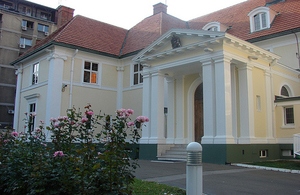DIO encourages return of red squirrels to Kirkcudbright Training Centre
Working with the Dumfries and Galloway Pine Marten Group, the team will install pine marten den boxes on the training area using funding from DIO’s Conservation Group. The Balmae area has a population of grey squirrels, which has displaced the native population of red squirrels.
Research has shown that where pine martens have been reintroduced or encouraged, red squirrels flourish. This is because pine martens are a natural predator of squirrels, but red squirrels are much more cautious of pine martens than their grey cousins.
There is evidence of existing pine marten activity in the area, but it is mostly migratory. The team hope that installing six den boxes will encourage a permanent population of pine martens.
WO2 Scott Maclean, Deputy Training Safety Officer for Kirkcudbright Training Centre, who is leading the initiative for DIO, said:
Looking after our land and wildlife is extremely important to DIO. We’re hopeful this will make a real difference to the ecology of the area by encouraging the return of native red squirrels. We’ll be monitoring the pine marten den boxes using trail cameras and if this initiative is successful, we’d like to expand it to more of Kirkcudbright Training Area.
Dr Stephanie Johnstone, Chair Dumfries and Galloway Pine Marten Group, said:
We are delighted to be working with the MOD at the Kirkcudbright Training Area. The site is actively managed by the MOD to improve biodiversity and the extensive area contains a unique mosaic of habitats that provides opportunities for pine martens and many other species to thrive.
The installation of den boxes at the Kirkcudbright Range will benefit pine martens by providing them with a safe place to over winter and breed, replicating the scarce natural resource of large tree cavities within the landscape. Pine martens suppress invasive non-native grey squirrels at the landscape scale and the establishment of a pine marten population on the range will help support the existing on-site efforts to remove grey squirrels for the protection of the local native red squirrel population.
The MOD staff at Kirkcudbright have been enthusiastic in their support of our goal to assist the recovery of this native predator in Dumfries and Galloway and we look forward to continuing to collaborate with the local MOD team in the years ahead.
This work forms part of a wider project to rejuvenate the Balmae Lake region of Kirkcudbright Training Centre. Led by WO2 Maclean, staff from DIO staff and industry partner Landmarc Support Services have removed non-native plant species such as rhododendron, montbretia and bamboo and replaced them with Scottish wildflowers. It is hoped that this will increase insect numbers and diversity of insect species.
They have removed scrub to allow more light to reach the forest floor and have improved the path around the lake and added a small picnic area to encourage responsible public access. Canadian pond weed has been removed from the lake and a new sluice gate installed to allow the water level to be raised to its natural depth, increasing water quality and flow dramatically. WO2 Maclean also plans to reintroduce native fish species, primarily brown trout.
